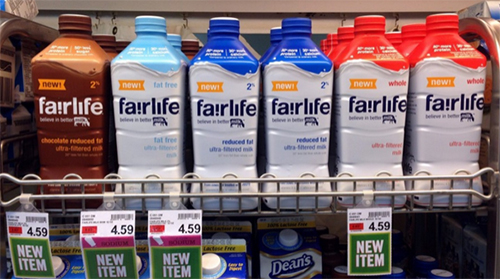Coca-Cola Tries To Revamp Its Image With A ‘Makeover’ Of Milk

By BILL BONVIE
At a time when healthier food is reported to be more popular than ever, some 56 percent of the North American consumers who participated in a recent Nielsen Global Health and Wellness Study said they distrust claims found on nutritional products.
Why such skepticism? Well, let’s just consider one of the latest such claims – the one being made on bottles of Coca-Cola’s newly introduced dairy product called “Fairlife” (about as lame a name as ever emerged out of what must have been a marathon creative competition).
And right beneath that product name you’ll find the slogan “purely nutritious milk.”
Now, what might that mean, exactly?
Well, the first definition of “purely” appearing in my dictionary is “in a pure manner, without admixture.” And “admixture” is defined as “the act of mixing” or “the state of being mixed.”
Yet, in the publicity accompanying its launch in various test markets, Fairlife is described as a form of milk that’s been processed in a special “soft filtration” system developed to separate the milk into five components – water, protein, fat, lactose, and nutrients –which are then recombined in different proportions to provide 30 percent more protein and 50 percent more calcium. I don’t know about you, but that sure sounds like “admixture” to me (far more so than being merely homogenized).
The again, maybe “purely” nutritious is intended in the sense of “entirely” or “completely” nutritious, with any idea of actual purity being purely coincidental.
Milk identity theft?
Whichever, Fairlife’s list of ingredient consists of nonfat filtered milk (high protein, high calcium, reduced sugar), lactase enzyme (to make it lactose-free), vitamin A Palmitate, and vitamin D3 – all of which might sound innocuous enough if the idea of “enhancing” a formula created by Mother Nature by separating, altering and recombining the ingredients doesn’t bother you (and if the premium price — the kind usually charged for organic milk – seems justified, given that the product was described by one Coca-Cola executive as “the premiumization of milk”).
What may bother many consumers, however, is that we’re talking here about the Coca-Cola Company, whose trademark products have up to now been carbonated beverages that for many years have been sweetened with two of the least healthy substances on the planet — high fructose corn syrup, the cheap sugar substitute that studies have linked to obesity, diabetes, heart problems, nonalcoholic fatty liver disease and even pancreatic cancer, and aspartame, the neurotoxic synthetic sweetener that was linked to brain tumors and seizures in laboratory animals and has since been the source of thousands of adverse reactions reports, as well as being considered damaging to brain cells in children and the elderly.
There’s also the fact that the Coca-Cola Company is already being sued for allegedly having a misleading label on its subsidiary Minute Maid’s “Pomegranate Blueberry Flavored Blend of 5 Juices” beverage, which is actually 99 percent apple and grape juice – a case that the U.S. Supreme court has ruled may proceed by an 8-0 vote.
In light of all that, it should perhaps come as no surprise that some consumers don’t appear to have been all that impressed by either the company’s having diversified into dairy or by the titillating ad campaign it has created for Fairlife featuring models whose scanty attire appears to be made of milk. “ ‘Fairlife Milk – made by Coca Cola’. That tells us all we need to know about the un-health benefits and value of this drink,” went one such response to an article about the product, while another called the company “the antiChrist of nutrition.” Still another found “the blatant sexualization of women in their ads” to be “offensive,” as well as noting that she didn’t buy Coca-Cola products and is “not a baby anymore and don’t need milk, especially from another species of animal. “
But then, the fact that many of today’s health-conscious consumers no longer consider milk itself (and particularly milk that’s not organic) to be the ultimate health drink is something that the company was either unaware of or chose to ignore when it decided that a milk ‘makeover’, along with visions of maidens dressed only in milk, was the way to go to give itself a more wholesome image.
Source(s):
foodidentitytheft.com
Health Freedom Alliance
Health & Wellness Foundation
CHAD Foundation
http://www.healthfreedomalliance.org
http://www.healthfreedoms.org/coca-cola-tries-to-revamp-its-image-with-a-makeover-of-milk/